
~ ~ ~
Estos anuncios son interactivos. Toque en ellos para seguir a las páginas de web
Photos of would-be Georgia voters standing—and, in some cases, sitting—in long lines after 11 pm to cast their ballots in the state’s primary on Tuesday encapsulated what rights groups and lawmakers decried as a disastrous day for democracy and an entirely predictable result of years of deliberate voter suppression efforts by Republican lawmakers and the U.S. Supreme Court.
The myriad issues that plagued Georgia’s primary Tuesday—malfunctioning new voting machines, an insufficient number of paper ballots, too-few poll workers, polling places opening late—are hardly unheard of in the state, given that similar problems threw the 2018 midterm contests into chaos, sparking calls for better preparation and stronger protections against disenfranchisement.
The coronavirus pandemic added another layer of hurdles, and provided Republicans with additional opportunities to limit ballot access.
“The ACLU warned that insufficient resources were allocated for polling places, machines, in-person election staff, and staff to process absentee ballots and that this would result in the disenfranchisement of voters in 2020,” Andrea Young, executive director of the ACLU of Georgia, said in a statement. “It gives us no pleasure to be proven right.”
“Whether it is incompetence or intentional voter suppression,” Young added, “the result is the same—Georgians denied their rights as citizens in this democracy.”
In response to drone footage showing long lines outside of a polling place in Atlanta, Rep. Alexandria Ocasio-Cortez (D-N.Y.) suggested it’s more of the latter, writing, “This is by design, and it’s their test run for November.”
“Republicans don’t want vote by mail because it chips away at their ability to do exactly this: target and disenfranchise black voters and people of color,” Ocasio-Cortez wrote. “These scenes are specifically happening in black communities, not white ones.”
Rep. Pramila Jayapal (D-Wash.), co-chair of the Congressional Progressive Caucus, echoed Ocasio-Cortez. “This is no accident,” Jayapal said. “Black and brown people have been kept out of our elections—100% on purpose and by design. We must end racist voter suppression efforts, restore, and expand voting rights, and build a democracy that ensures every voice is heard.”
As Ari Berman of Mother Jones noted late Tuesday, Georgia—which is poised to play a major role in the 2020 presidential election in November—”closed 214 polling places after the Supreme Court gutted the Voting Rights Act” in 2013.
“There were 80 fewer polling places for the June primary in metro Atlanta, where a majority of black voters live,” Berman tweeted. “Mitch McConnell is blocking legislation passed by House Dems to restore the VRA.”
Georgia’s Republican Secretary of State Brad Raffensperger, who ignored repeated warnings that the state’s new voting system would not be ready by 2020, was quick to point fingers at individual counties—particularly DeKalb and Fulton, which both have large black populations—for the voting problems, vowing to in a statement to launch an investigation to “determine what these counties need to do to resolve these issues before November’s election.”
Michael Thurmond, Chief Executive Officer of DeKalb County, fired back. “It is the Secretary of State’s responsibility to train, prepare, and equip election staff throughout the state to ensure fair and equal access to the ballot box.”
“Those Georgians who have been disenfranchised by the statewide chaos that has affected the voting system today in numerous DeKalb precincts and throughout the state of Georgia deserve answer,” Thurmond added.
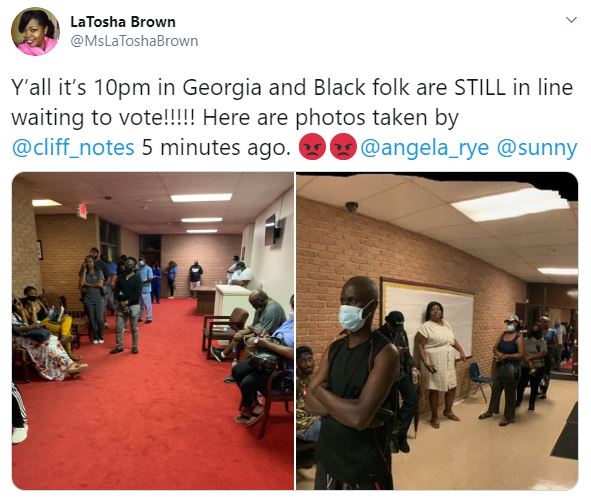
With the results of the statewide primary contests still rolling in, Common Cause Georgia executive director Aunna Dennis said in a statement that “the obstacles that Georgia’s voters have faced in this election are simply unacceptable.”
“It’s also unacceptable that the officials entrusted with administering the elections have spent the day dodging blame, rather than accepting responsibility,” said Dennis. “Today’s problems were avoidable—and they disenfranchised voters. That must not be allowed to happen again.”

Contact us by email at fund4thepanamanews@gmail.com
To fend off hackers, organized trolls and other online vandalism, our website comments feature is switched off. Instead, come to our Facebook page to join in the discussion.
These links are interactive — click on the boxes
Does he wish to preside over all-out class warfare during an epidemic, or does he wish to unite the nation in the face of a serious biological threat? The people to whom he has been listening want the former. They’d let the water systems go out and send the poor to streams tainted with coronavirus-laden sewage to wash. Their profits would be sacred, but not so the lives of the working people who produce them. Every penny of interest compounded during the crisis would be collected. The last of Panama’s assets held in common, starting with the public schools, would be privatized.
And Panama would dissolve into civil warfare under the business leaders’ plan of action.
Run up the debt some more, and keep the PRD apparatchiki happy by allowing them various skims? But the nation’s line of credit is about maxed out.
From day one of the crisis, as soon as the president saw the US Centers for Disease Control’s dire range of possibilities, as the quarantine was ordered, as we watched the horrors of New York City unfold, it might have been expected that a president who was an agriculture minister would have begun an urban and rural victory garden program. As soon as the numbers of infected people sent home to shut themselves in until they recover began to rise, we might have expected a public system of deliveries to keep such people supplied so that they did not leave their homes. We might have expected provisions to be made for healthy elderly folks to be given safer shelter than multi-generational households where they had been living. We might have expected a count and some provision for the nearly half of Panama’s work force that labors informally. Did Nito intend to declare a state of siege? He didn’t make proper preparations for Panama’s ordeal.
Even with restrictions only partial and regional, some of the obvious things that were neglected need to be belatedly done.
Beyond that, there ought to be some labor-intensive public works programs that provide needy people with income and something constructive to do, and which ignore the paralyzing old dibs.
The telecom companies divided Panama into service areas and breached their contractual duties for national coverage, such that online schooling does not work in much of the Interior. Let’s not pay those companies to do what they were supposed to have done long ago, but build our own public telecommunications system, perhaps with Chinese assistance. Let’s put young people who might otherwise be troublesome to work on fulfilling the broken promise of Internet for all.
We have had shortages of protective gear, and casualties among doctors, nurses, cops, firefighters, immigration officers and so on because of it. We have also had small-scale production of such necessities at universities. That ought to be ramped up into full-scale factories that provide Panama’s front-line responders with the protection they need.
We built a spare hospital in a short period of time, just in case. We will probably need it. “Irregularities” there were, which may or may not be the same thing as corruption. There should be transparency and accountability, but not the regular bidding wars with all the usual delays and corruption. Better. In fact, if Panama has its own public sector corps of engineers for many projects, at least the duration of this emergency.
If this is, constitutionally speaking, a state of emergency akin to a state of war – one in which more than 400 have already fallen with no end in sight – Panama should go on an appropriate footing. That’s the first part of putting the country back to work.

Yes, there is the old game. Someone who owns a home leaves during an emergency, then comes back and finds someone else living there with a note from a mayor saying that they own it. Or comes back to a bare slab, all else having been stripped.
Those who are going away and intend to return ought to be careful about choices of caretakers and execute wise powers of attorney. There should be special police, prosecutors and judges to suppress the usual games during this emergency.
The land grabbing reputation has not only already set us up for some settling of accounts that could be quite bitter, but if unchecked it would be a major impediment for foreign investment when the country needs it to rebuild. More immediately it’s a problem for those foreign property owners who take the evacuation flights. They need to protect themselves but should not be left to their own devices.
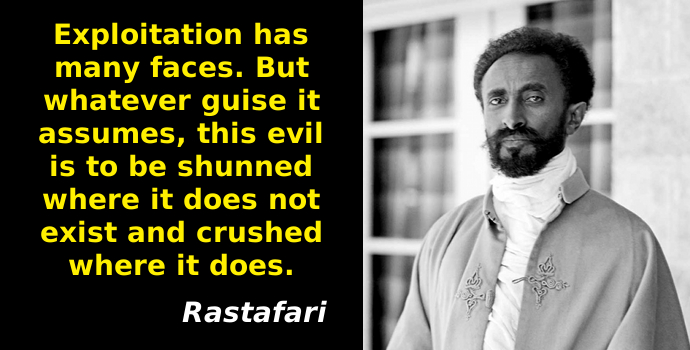
Reading stories is bad enough but writing them is worse.
L. M. Montgomery
The measure of a country’s greatness is its ability to retain compassion in times of crisis.
Thurgood Marshall
Male and female represent the two sides of the great radical dualism. But in fact they are perpetually passing into one another. Fluid hardens to solid, solid rushes to fluid. There is no wholly masculine man, no purely feminine woman.
Margaret Fuller
Contact us by email at fund4thepanamanews@gmail.com
To fend off hackers, organized trolls and other online vandalism, our website comments feature is switched off. Instead, come to our Facebook page to join in the discussion.
These links are interactive — click on the boxes
More than seven months after claims of fraudulent elections sparked an undemocratic coup that led to the ouster of Bolivian President Evo Morales, the New York Times late Sunday reported on new research showing the US-led Organization of American States used flawed data and analysis to support its widely cited contention the voting was rigged.
“It was clear from the start, but now even the NYT is admitting: what happened in Bolivia was nothing short of a coup by the United States and its OAS puppet, deposing one of the most successful democratically elected leaders in modern Latin American history,” tweeted journalist Glenn Greenwald in response to the tTimes reporting.

As Common Dreams reported in November, US officials cited the OAS report on the election as a justification for backing the coup that deposed Morales, the left-wing Indigenous former president.
Despite reporting from the Center for Economic and Policy Research (CEPR) casting doubt on those claims within 24 hours of the OAS making them, the Times only covered the problems with the US-dominated organization’s analysis after a study (pdf) from three independent researchers found the same results.

As the Times reported Monday:
The authors of the new study said they were unable to replicate the OAS’s findings using its likely techniques. They said a sudden change in the trend appeared only when they excluded results from the manually processed, late-reporting polling booths.
This suggests that the organization used an incorrect data set to reach its conclusion, the researchers said. The difference is significant: the 1,500 excluded late-reporting booths account for the bulk of the final votes that the OAS statistical analysis claims are suspicious.
In a statement, CEPR research associate Jake Johnston said that the OAS “continued to repeat its false assertions for many months with little to no pushback or accountability” despite his organization’s finding to the contrary.
“For those paying close attention to the 2019 election, there was never any doubt that the OAS’ claims of fraud were bogus,” said Johnston.
Since the coup, the human rights situation in the Latin American country has gone from bad to worse as the government of far-right interim president Jeanine Áñez has rolled back reforms put in place by Morales, opened the country’s resources to private exploitation, and delayed scheduled elections under the pretext of public health due to the coronavirus outbreak.
“The OAS bears responsibility for the significant deterioration of the human rights situation in Bolivia since Morales’s ouster,” said CEPR co-director Mark Weisbrot.
Weisbrot warned that if the OAS and its leadership is “allowed to get away with such politically driven falsification of their electoral observation results again, this threatens not only Bolivian democracy but the democracy of any country where the OAS may be involved in elections in the future.”
Contact us by email at fund4thepanamanews@gmail.com
To fend off hackers, organized trolls and other online vandalism, our website comments feature is switched off. Instead, come to our Facebook page to join in the discussion.
These links are interactive — click on the boxes
As the health statistics from the previous week had already announced, the outbreak of COVID-19 was reinforced with the opening of Block 2 of the economy. Daily reported cases reached 400 and 500 for almost the entire first week of June.
The 16,000 accumulated cases with 386 deaths were surpassed, placing the Social Security Fund’s Hospital Complex on the verge of collapse, with 90% occupancy of ICU beds and respirators. All of which forced MINSA to restore the quarantine in the provinces of Panama and Panama Oeste, but without closing Block 2.
Polo Ciudadano repudiates the attitude of certain officials and the media, which blames citizens for this setback. It is alleged that people do not take the health measures that have been recommended (use of masks, physical distancing, etc.). While there can be no denying the existence of some shameless people, many of them adolescent boys and young men, who insist on disregarding the measures, this is not the case for most people.
The authorities and the media at the service of the economic powers that be must ask themselves how much responsibility they have for this outbreak, which is worse than the initial one. Was there no rush to open the second block due to pressure from the business sector when the outbreak of infections had already started? Were MINSA’s own criteria not to open until the contagion rate (Rt) was less than 1?
Of course, by partially opening up economic activity, people who have been confined for more than two months without working or producing income, went out to find their daily bread. Above all, those who, while being poor, did not receive the “solidarity bond” and its $80, which is not enough to feed a family.
What it the fault of people arriving at the bus stop and not finding enough means of transportation, or having to travel crowded without “distance”? Whose fault is it that public transportation is historically inefficient, since long before the pandemic? Whose responsibility is it that important areas of the Arraijan district, one of the most affected, do not have a constant supply of drinking water?
The blame for the massive contagion in the penal centers must be sought in the National Police and the Ministries of Security and Government. The responsibility for the massive contagion of patients and health personnel in a room of the Hospital Complex belongs to the authorities of the Social Security Fund.
At this time, infections are endemic in the poorest neighborhoods of Panama City (Tocumen, 24 Diciembre, Pacora, Calidonia, Curundu, El Chorrillo), and certain areas of the San Miguelito and Arraijan districts. These are reas where the average family income is a little more than $300, which barely covers basic food staples, making it difficult for people to acquire masks, due to what’s a high price for those so poor. In addition, these are neighborhoods with awful transportation services, garbage collection and drinking water.
The responsibility for this historical social inequality, which has made Panama one of the 10 most unequal countries in the world and the third in Latin America, lies with the business elite that preys upon the economy and has been behind the corrupt governments of all the parties that have governed.
Polo Ciudadano holds the MEF minister, Héctor Alexander, and the economic team that advises President Cortizo responsible for the ruthless increase in inequality and the lack of “equal health for all,” for weakening public health systems, which will cut them further. The cuts ranged from $300 million to the Social Security Fund to more than $100 million from MINSA in 2019. That was to maintain the commitment to pay $3 billion of external debt, while taking resources from sectors such as education. They managed take out more than $5 billion in new loans without reporting it on the books. They favor banks and deny a debt moratorium on loans to citizens.
The scandal of the modular hospital is a sandwich compared to the excesses made in the Ministry of Economy and Finance by its master and his INDESA advisers, the well-known Guillermo Chapman and Nicolás Ardito Barleta. We demand that along with the ministers of the Presidency and the MOP, the current head of the MEF, who has been responsible for neoliberal policies in Panama since the time of General Manuel Noriega, resign.
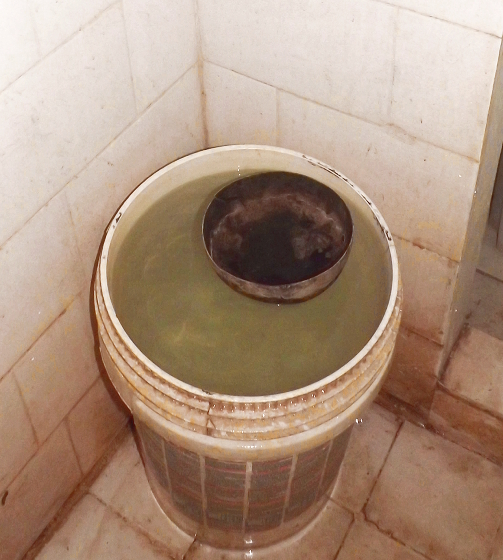
Contact us by email at fund4thepanamanews@gmail.com
To fend off hackers, organized trolls and other online vandalism, our website comments feature is switched off. Instead, come to our Facebook page to join in the discussion.
These links are interactive — click on the boxes
Contact us by email at / Contáctanos por correo electrónico a fund4thepanamanews@gmail.com
To fend off hackers, organized trolls and other online vandalism, our website comments feature is switched off. Instead, come to our Facebook page to join in the discussion.
Para defendernos de los piratas informáticos, los trolls organizados y otros actos de vandalismo en línea, la función de comentarios de nuestro sitio web está desactivada. En cambio, ven a nuestra página de Facebook para unirte a la discusión.
~ ~ ~
These announcements are interactive. Click on them for more information.
Estos anuncios son interactivos. Toque en ellos para seguir a las páginas de web.
Uninformed questions, preoccupation with last month’s scandals, who gets what — such are the usual concerns of our political caste. These were mitigated by the Health Committee’s president, Dr. Crispiano Adames, a physician as well as a legislator, in the 15 questions that Dr. Juan Miguel Pascale, director of the Gorgas Memorial Institute — Panama’s health research organization — was called before the committee to answer. Things soon went beyond the immediate call.
There were the explanations of which tests do what for a body of lay men and women that will play a role in public health policy decisions. No, the blood tests for antibodies don’t tell if someone is presently infected or infectious, although they are useful for other purposed. A shipment of those is on the way. Dr. Pascale opined that what’s most needed are the swab tests which in half an hour or less tell if a person is infected.
And what’s Dr. Pascale’s take on the state of the epidemic here? “In Panama I doubt that we will even have five percent hopefully seven percent of our people who have already gotten the coronavirus. There are a large number of people susceptible to the virus, so all the more reason we must take care not to get infected.” It was quite the implicit slam against the talk of “herd immunity” and those who would base public policy on that.
Adames gave some assurances that test procurement would only be from reliable companies with experience in that business. Same old same old? Maybe some international leaders in the field? Good and bad things to ponder, but we are led to believe not some guy off the street nor somebody’s cousin who is in the road construction business.
The session’s big surprise, which may have broader implications?
Pascal e told a tale of vicious fighting over medical supplies. “Day by day, month by month, I am struggling to get the necessary supplies to attack this pandemic and make diagnoses, but there is fierce competition for RNA extraction kits,” he told the committee. “A a shipment that was coming to Panama with an RNA extraction kit was stopped in El Salvador — their president said ‘I keep it, because I need it, that’s what happened in Europe.'”
The problem of safe shipping routes in a time of crisis may go beyond medical lab supplies and the Health Committee’s purview.
Contact us by email at fund4thepanamanews@gmail.com
To fend off hackers, organized trolls and other online vandalism, our website comments feature is switched off. Instead, come to our Facebook page to join in the discussion.
These links are interactive — click on the boxes
In March Nito Cortizo put the nation’s’ pandemic response largely in the hands of health minister Rosario Turner. The economic aspects of that, including emergency purchases and food relief for those left locked in their homes without income, he delegated to the vice president, Gabriel Carrizo, who came to public office from the world of banking. She coordinated a defense that kept Panama’s death toll way down per capita compared to a lot of other countries. The VP oversaw multiple purchasing scandals and food relief that left out most of those in the informal sector, middle class people who live paycheck to paycheck in neighborhoods not thought of as poor and many others in need.
Long about the middle of May, the president began to think of the next phase, in consultation with elite business leaders. It appears that two main aims were given priority: getting businesses back open and avoiding the expense of a food relief program that reaches everyone. And from the initial consultations with the business leaders who had given him the ill-fated constitutional reforms last year, he expanded the number of those people “in the loop” just a bit.
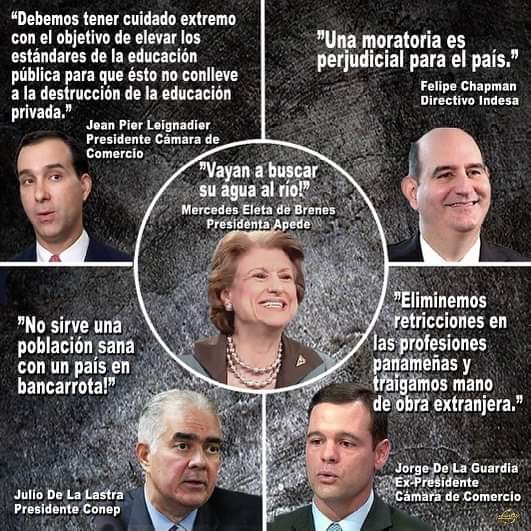
Organized labor, on the other hand, was more nuanced all along, but without much attention from the corporate mainstream media. They were hard-hit by the quarantine, but instead of opposing those measures calling for “a quarantine without hunger.”
To understand the subtleties, it helps to know who Panama’s main unions are. The private sector is mostly unorganized, even if you exclude the huge informal sector that’s nearly half of the Panamanian work force. The various company unions are properly excluded from any consideration of what and who is a union. The heavyweights among what’s left on the private side are the construction workers, the brewery and soft drink workers and some of the port workers. The SUNTRACS construction workers’ union is perhaps the country’s best known , and the SITRAFCOREBGASCELIS soft drink and brewery union might be better known if it had a pronounceable name. Both have leftist leaders, of different factions.
The public sector is far better organized, but there, too, certain organizations need to be counted out as real unions. Where the work force turns over every five years with political patronage hiring and firing, the union tends to be a racket. But there are doctors, nurses, teachers, university professors, canal pilots and other skilled trades at the ACP among the highly skilled segments of the public work force who have unions and who are not readily intimidated by threats of mass firings and the hiring of scabs. The physicians’ unions, AMOACSS in the Seguro Social system and the doctors at the Ministry of Health’s flagship Hospital Santo Tomas, say that the epidemic is far from under control and the June 1 end of quarantine and opening of many businesses was a mistake. The government’s own late May and early June health statistics tend to underline the doctors’ objections. And if Panama’s tiny white aristocracy tends to treat all educated professionals with roughly the same respect that they give their domestic employees, the rest of Panama’s organized workers, and many citizens who belong to no union, give great deference and respect to what the doctors say.
When, during the quarantine, the left side of Panamanian labor and its friends organized night-time pot banging protests in parts of the metro area, the demand was not to end the quarantine but to end hunger while the lockdown was underway. Political demands on doctors’ orders.
However, among Panama’s more than four million people, only 621,792 people get the Panama Solidario food assistance, which is only $80 a month.
Leave it to big business to embrace unproven notions about COVID-19, or to twist things that are know in their favor.
For example, by maintaining that the best solution is for all Panamanian working people to come out and get infected so that there might be a “herd immunity” that is not known to exist with this disease. By most projections, though, that means many thousands of deaths. The SUNTRACS response? “We are not a herd.”
For example, by noting that since older people are more vulnerable, advocating an end to all seniority and pay scales in labor relations, so that employers can get rid of higher-paid senior workers in favor of the “less vulnerable” and lower-paid newer employees. (And by the way , weed out the known union activists.)
As part of May’s moves to set ground rules to restart the economy, there were talks between labor and management, mediated by the Ministry of Labor Development. As with last year’s minimum wage talks, business representatives were intransigent. Labor walked out.
So, with the end of the lockdown came the resumption of labor demonstrations.
So, what does President Cortizo face? A record national debt, and international lenders who will demand conditions for any new loans or any forbearance on old ones. A grievously stricken world shipping industry, and pandemic-demolished economies in all of the countries that buy from our duty-free import/export zones. Wounded air travel and tourism industries negating any quick return to profitability in those sectors. The world Food and Agricultural Organization, a UN agency, warns that countries that depend on imported food — as Panama does — are likely to find over the coming months that they will find it hard to scrape up the money to buy food.
Nito promises that “in 2021 we will have a robust economy.” If it’s in comparison to what we have had, that might be an easy bet. If it really does quickly become a boom economy, then the various economic sectors will battle to see whose losses in these times get covered and whose don’t. The big unknown, though, is what our health situation will be a year from now.
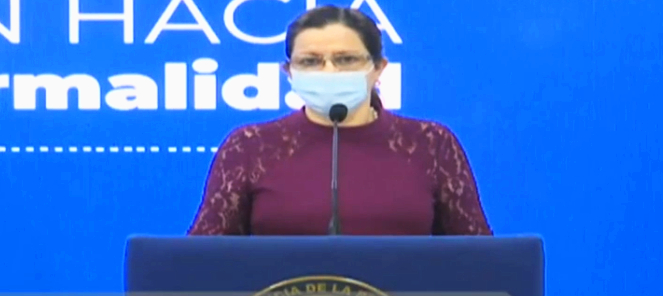
Contact us by email at fund4thepanamanews@gmail.com
To fend off hackers, organized trolls and other online vandalism, our website comments feature is switched off. Instead, come to our Facebook page to join in the discussion.
These links are interactive — click on the boxes
I was naïve until I wasn’t.
At just 18, the day after I graduated from high school, I drove from Boston to Atlanta to work with the Student Nonviolent Coordinating Committee (SNCC).
Two weeks later, on June 21, 1964, we got word that three young civil rights workers — James Chaney, Mickey Schwerner, and Andrew Goodman — had not returned from investigating a black church burning near Philadelphia, Mississippi. Thirty churches burned that summer.
I was working the night shift and spent the evening calling jails, hospitals, police, and the FBI, searching for word of the young men. I called John Doar, head of the Justice Department’s civil rights division, who pleaded with local FBI agents to help search. The agents refused.
At midnight, I tearfully called the boys’ parents to report our failure in finding them.
Forty-four horrible days later, the civil rights workers were found buried in an earthen dam. Schwerner and Goodman, both white, were each killed with one bullet to their hearts.
Chaney, a black man, had been brutally beaten and shot multiple times. According to an autopsy report, Chaney’s, “jaw was shattered, the left shoulder and upper arm were reduced to a pulp; the right forearm was broken completely across at several points, and the skull bones were broken and pushed in toward the brain.”
That wasn’t all that turned up. In the course of dredging nearby rivers and swamps, Navy seamen dispatched by President Johnson also uncovered the bodies of 10 more black men — some tied up with wire and rope.
In 1964, lynching black people was no longer the open, public entertainment it had once been, but it was still common. Sadly, this remains the case today.
With the latest murders of unarmed black people — Ahmaud Arbery in Georgia, Breonna Taylor and David McAtee in Kentucky, George Floyd in Minnesota — we can no longer deny that racism spans our country from coast to coast, from Mississippi to Minneapolis.
It dates from the earliest years of our nation right up to the present. And from the late 19th century to today, cops have been given impunity, if not encouragement, to take out their aggression on black people — especially when they protest their mistreatment.
In the 1930s, the NAACP would hang its banner declaring, “A Man Was Lynched Yesterday,” on a flagpole reaching out over Fifth Avenue in New York City. We must revive that practice. But now, not far from a century later, we must do more. In particular, white Americans cannot leave it to others to seek justice alone.
We must demand more than investigations and firings. We must sentence those who commit these crimes to maximum-security prisons, not the country club style, minimum-security detention facilities where they can sit alongside politicians and white-collar criminals.
We must also end mass incarceration, the bail bond system, and the disenfranchisement of those who have served their time. And we must eradicate all the legal and social structures that continue to harm the souls and pocketbooks of the previously enslaved citizens of America, a country built on the backs of men and women brought to our shores in chains.
Back in 1964, if the jailer’s wife who answered my phone call had told me the truth — that Chaney, Schwerner, and Goodman were indeed in that jail — or if the FBI had done its job, those three young men could be alive today.
Back then, Mississippi racists complained that we sought more than an end to segregation; that we wanted to change their way of life. We did want that. And we still do. We must finally make white supremacy and racist aggression socially and legally unacceptable.
This work is past due.
Contact us by email at fund4thepanamanews@gmail.com
To fend off hackers, organized trolls and other online vandalism, our website comments feature is switched off. Instead, come to our Facebook page to join in the discussion.
These links are interactive — click on the boxes